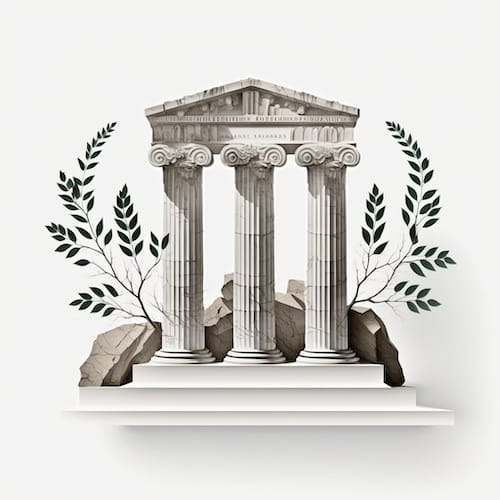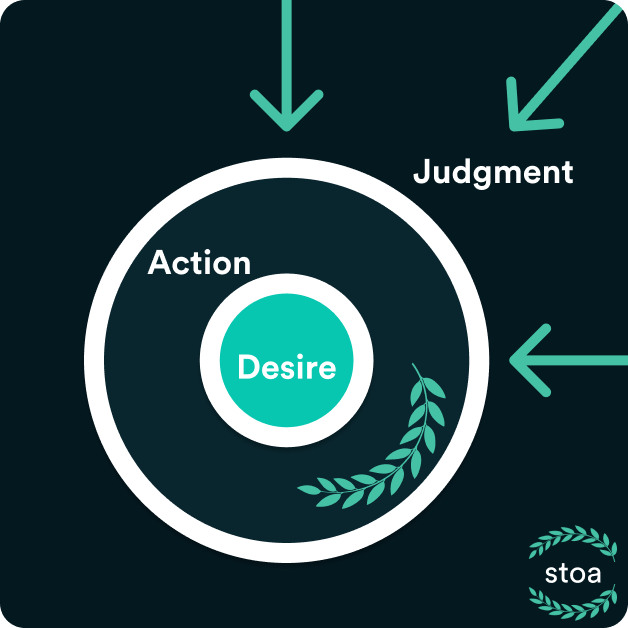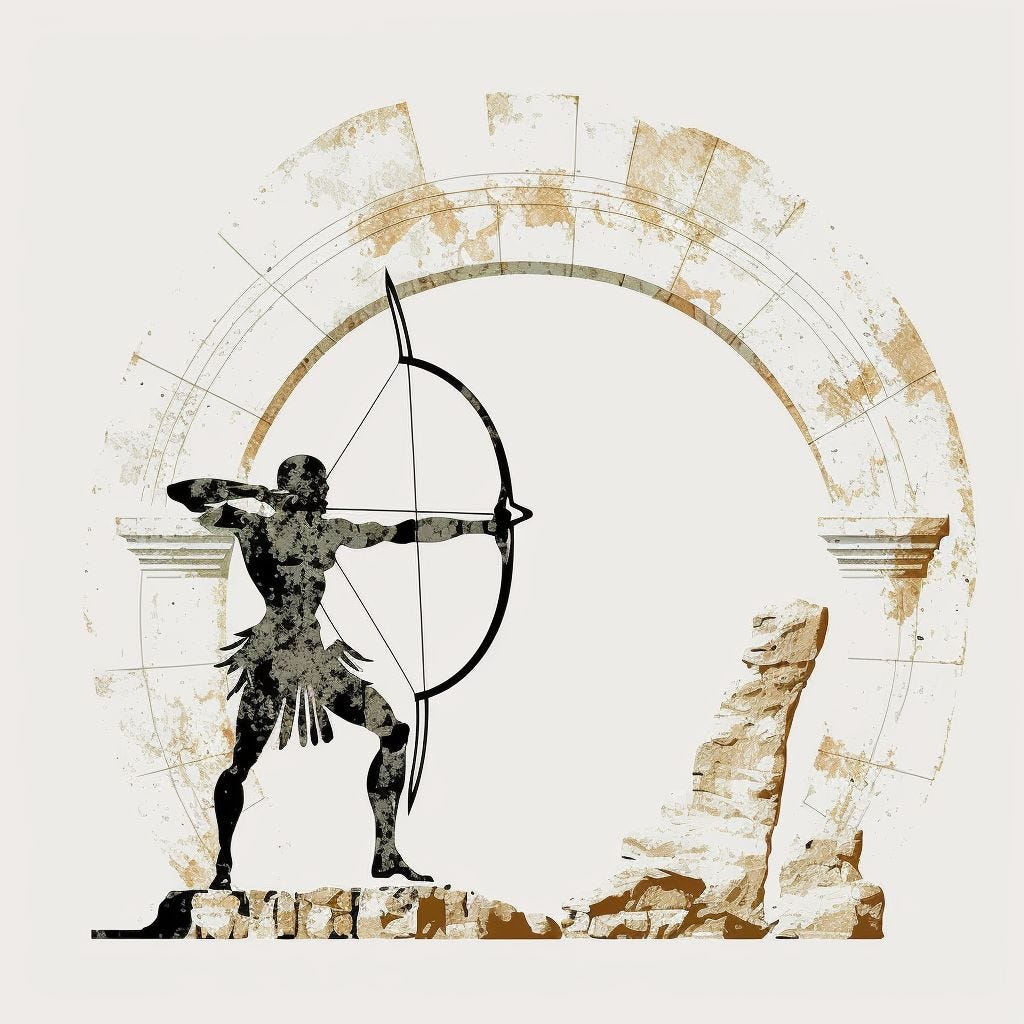The Stoic Training Program
The Three Tenets of Modern Stoicism and The Three Disciplines of Ancient Stoicism
Stoicism is a framework for building resilience and living well.
Developed in ancient Greece and Rome, everyone from slaves to emperors put it into practice. Millions of people have turned to it today to live better and manage what life throws at them.
Stoicism is not just a framework for operating under high-stress environments – though it is that – it’s a philosophy of life. By learning about the theory of Stoicism and putting it into practice you can become more resilient and virtuous.
This piece explains three key beliefs of modern Stoics. It then lays out the three ancient disciplines for becoming more Stoic. By putting them into practice, you’ll be better able to handle what life throws at you.

Three Pillars
🏛️ The 3 Tenets of Stoicism
Here are 3 key Stoic ideas.
The first is simple: how you think about the world shapes how you experience it.
The Stoic and Roman Emperor Marcus Aurelius once wrote:
Today I escaped anxiety. Or no, I discarded it, because it was within me, in my own perceptions — not outside.
Marcus Aurelius, Meditations 9.13
How we think determines how we feel. This was discovered by ancient philosophers but finds support in contemporary work too. Neuroscientist Lisa Feldman Barrett writes:
You are an architect of these experiences. Your river of feelings might feel like it’s flowing over you, but actually you’re the river’s source.
Lisa Feldman Barrett, How Emotions Are Made
Our emotions are downstream from our interpretation of the world.
The second idea is: we can change how we think.
We are not ruled by the external world or unconscious forces. Instead, each of us has the power to shape who we are. We choose how to react to every thought. Those decisions determine who we will be.
That's a message of hope and responsibility. Because we can change what we think, we can control how we feel, and more importantly, transform who we are.
If you do not yet see your own beauty, do as the sculptor does with a statue which must become beautiful: he removes one part, scrapes another, makes one area smooth, and cleans the other…In the same way, you too must remove everything that is superfluous, straighten that which is crooked and purify all that is dark until you make it brilliant. Never stop sculpting your own statue, until the divine splendor of virtue shines in you.
Plotinus, Enneads 1.6.9
The final idea is: good decisions and judgment are what fundamentally matters. Stoicism is a philosophy of life.
For Stoics, the good life involves building the character to make excellent decisions and pursue knowledge. Everything else is only “conditionally” good. Power is only good if it doesn’t corrupt. Pleasure is only good if it is caused by a good thing. Status should only be satisfying if it is deserved.
Only good character is unconditionally good. One cannot ask any more of human beings other than that they build the character to do the right thing, at the right time, for the right reasons.
If we do that, we will live a virtuous and tranquil life.
What is the goal of virtue, after all, except a life that flows smoothly?
Epictetus, Discourses 1.4.5
Stoicism offers a path to that kind of life. It’s a philosophy for people like us – decision-makers in the broadest sense.
🏛️ The 3 Stoic Disciplines
How do you do it? The ancient Stoics developed disciplines to learn their philosophy. Each discipline covers an important domain of life. By training in these disciplines, you will become more Stoic.
Before covering these disciplines, you need to know about the archer.
The ancient Greeks and Romans saw the virtuous person as an excellent archer. Their job is to aim at the target, fire, and stay alert to their surroundings. They only focus on what is up to them. If someone moves the target after they’ve shot or a random gust of wind appears unforeseen, this does not mean they failed.
The three disciplines concern three things: desire, action, and judgment. These map onto an archer’s skills of aiming, firing, and perception.
Check out the following diagram:

The Three Disciplines
In the center of the circle rests the subjects of the discipline of desire. These express what we value. We desire what is good and are averse to what is bad. The problem is that so many of us want what is not good for us. We live well when our desires align with what is up to us: virtue. The discipline of desire is all about training ourselves to value what fundamentally matters: our judgments and decisions. Think of this discipline as choosing what to aim at. Just as the archer points at the bullseye, we must target improving our character. Nothing else fundamentally matters.
Outside of this first circle, reside what the Stoics called externals. These are the subject of the discipline of action. These things are called externals because they are not up to us. We can influence our body, friends, and society, but we do not have direct control over them. Nonetheless, we need to decide how to be healthy, what it is to be a good friend, and when to try to influence our society. This is determined by our roles in life. Just as the archer builds the skill of being able to release the arrow with the right positioning and perfect amount of force, we must train in our roles to fulfill them as well as possible. Stoicism is not a passive philosophy. A Stoic is an excellent friend, partner, parent, neighbor, worker, and citizen.
And finally, we find the rest of the world. The outside world bombards us with messages, values, and emergencies each demanding our full attention and judgment. The discipline of judgment is all about how we handle this. Remember, our job is to believe what is true and focus on what is up to us. Just like the archer who is always alert to what surrounds them, we must be aware of the reality around us.

The Archer
🍬 Discipline of Desire
The more we value things outside our control, the less control we have.
Epictetus, Discourses 4.3.23
A revolutionary Stoic idea is the dichotomy of control. Some things are up to us, others are not.
What's up to us? Our judgments and decisions. That’s it. Nothing else.
Everything else is external.
Of course, we can make some outcomes more likely than others.
We may strive to succeed, build loving relationships, and live long and healthy lives.
But ultimately, these things: career success, friendships, and even our health are not under our direct control.
The world is too complex and chaotic.
Hence, the Stoics focused on making what we can ultimately control as excellent as possible. The discipline of desire is all about building ourselves into people who want to act as well as possible given our situation.
If you’re able to do that then you will be fully free. Applying it to your life will help you become more resilient and help ensure that you’re focusing on what matters.
The Stoic philosopher Epictetus encouraged his students to see life like a game of chance. Our decisions can influence outcomes. But ultimately, we don’t determine the cards we are dealt.
It’s how we play that matters.
🎯 Action
The discipline of desire concerns what we fundamentally want. Start by making fewer value judgments. Cut out all thoughts like "I need this to be happy.” We instinctively want the same things that others around us do. Don’t.
When you’ve reduced the intensity of desires to things outside of yourself, transform yourself into someone who values doing the best you can with what is up to you.
Dive into Stoic theory & clarify your own values. Think through what you deeply value. When you’ve done this, relentlessly focus on making the right decisions, in accord with those values.
💪 Discipline of Action
“The wise never ask what another serves, for only his actions will speak the truth” Seneca
The discipline of action is about using externals well. These are things that are not up to us – anything that is not our judgment or decisions.
The Stoics called such things indifferents because acquiring them is not what matters. Instead, how we use them does. Making good use of indifferents and handling them well distinguishes virtue from vice.
Wealth is indifferent, because you can't know if someone has a good life from their possessions. Life is about excellently using our social and rational capacities. It’s not about external accomplishments. Whether that’s fame, wealth, or career success. This is an obvious point – but it is true of so much of what we want. Our deepest desires are often for what the Stoics would deem indifferents.
So how does one do the right thing?
Start by internalizing the four cardinal virtues:

The Four Stoic Virtues
And consider how you can apply these virtues in the role you find yourself in life.
Remember, the ancient philosophies were practical. They were built for action, not ivory towers. It’s through our actions that we express our values. It’s our choices that reveal who we are.
Character is fate
Heraclitus
🎯 Action
Treat indifferents with indifference.
Cultivate the four virtues: courage, self-control, justice, and wisdom.
Contemplate what your roles are and how you can best fulfill them. How can you be a good human being? How can you be excellent in your natural roles (family, friend, citizen)? How can you be the best you in your chosen roles (careers, community)?
Practice Stoic wisdom and meditate on how to apply it in your life
👁️ Discipline of Judgment
Our judgments determine our experience.
Choose not to be harmed — and you won’t feel harmed. Don’t feel harmed — and you haven’t been.
Marcus Aurelius, Meditations 4.7
Once we desire what is good and use indifferents well then we must see the world accurately. That is what the discipline of judgment is all about.
Yet we often make false, confused, and harmful judgments. This causes suffering and prevents us from accomplishing our goals.
The discipline of judgment is about seeing things as they are. To do this, we need to focus on seeing what is true at all times.
Like the archer, we must stay alert to our internal and external environment.
It’s impossible to do this all the time without practice.
To start, when you notice negative or distracting thoughts, try these strategies.
Simply pause from making harmful judgments. Pause and see things as they are. You cannot be harmed by things that are not up to you.
Reframe negative feelings. The sensation of butterflies in the stomach can be interpreted as nervousness or excitement. It’s up to us. Accept discomfort and pain. If it is not up to you, you do not have direct control over it. Let it come, let it be, and let it go.
Through mindfulness meditation, you can practice reframing, accepting, and seeing sensations as they are. This is a critical tool for becoming more resilient. But it’s not the only one. There are other forms of contemplation, study, and practice that work too.
What’s important is that you try each method and stick with what works.
Remember Seneca’s Stoic maxim:
We suffer more often in imagination than in reality.
Seneca, Moral Letters 13
🎯 Action
Pause and refrain from making judgments.
Reframe negative emotions into true judgments.
Accept negative feelings and return to what matters.
Practice thinking better through meditation or contemplation practice.
🏛️ Philosophy for Better Living
Each of these disciplines is intertwined. When you value the right things, better actions and judgments will follow.
There are many resources working on modernizing the ancient wisdom that help so many of us live better. Read and listen to them. Most importantly, think through the questions they raise. And apply the lessons to your life. No one else can do that for you.
Objective judgment, now, at this very moment. Unselfish action, now, at this very moment. Willing acceptance—now, at this very moment—of all external events. That’s all you need.
Marcus Aurelius, Meditations 9.6
We look forward to progressing along the Stoic path with you.

